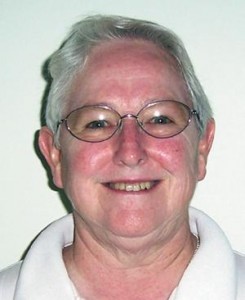
Q: Why can’t a person from another faith receive the Eucharist at our Mass?
— Patrick Moore (senior, Burlington Notre Dame)
A: The guidelines for receiving Communion, which are issued by the U.S. bishops and published in many missalettes, explain, “We welcome our fellow Christians to this celebration of the Eucharist as our brothers and sisters. We pray that our common baptism and the action of the Holy Spirit in this Eucharist will draw us closer to one another and begin to dispel the sad divisions which separate us. We pray that these will lessen and finally disappear, in keeping with Christ’s prayer for us ‘that they may all be one’” (John 17:21).
Your question may seem, to many, difficult to answer. In reality we want all to be able to receive the bread of life and feel welcomed at the table. There are many reasons that people of our own Catholic faith cannot receive the Eucharist.
The Church sets out specific guidelines regarding how we should prepare ourselves to receive the Lord’s body and blood in Communion. To receive Communion worthily, you must be in a state of grace, have made a good confession since your last mortal sin, believe in transubstantiation, observe the eucharistic fast, etc.
But for non-Catholics, it is the fact of our whole sacramental system. We have seven sacraments in the Catholic Church. Most of us receive six of them. We believe that we belong to a Church that is one, holy, catholic and apostolic. We believe in Jesus’ real presence in the Eucharist (transubstantiation).
So, the question may be as simple as asking what the non-Catholic believes about transubstantiation. Do they believe that the bread and wine are really transformed into the body and blood of Jesus Christ? How can a person have a valid reception of the Eucharist without some basic understanding of the heart of our faith? Can we say that individual has the great gift of faith in the Eucharist?
Another reason that many non-Catholics may not ordinarily receive Communion is for their own protection, since many reject the doctrine of the real presence of Christ in the Eucharist. Scripture warns that it is very dangerous for one not believing in the real presence to receive Communion: (1 Cor. 11:29–30).
Is this fair? Is this welcoming? It is a matter of faith.
“Because Catholics believe that the celebration of the Eucharist is a sign of the reality of the oneness of faith, life and worship, members of those churches with whom we are not yet fully united are ordinarily not admitted to Communion. Eucharistic sharing in exceptional circumstances by other Christians requires permission according to the directives of the diocesan bishop and the provisions of canon law. . . .” (www.usccb.org)
We must remember that the holy Eucharist is very important among the seven sacraments because, in this and in no other sacrament, we receive the very body and blood, soul and divinity of Jesus Christ. Innumerable graces come to us through the reception of holy Communion.
Communion is an intimate encounter with Christ, in which we sacramentally receive Christ into our bodies, that we may be more completely assimilated into him.
We must know that there are circumstances when non-Catholics may receive Communion from a Catholic priest. This is especially the case when it comes to Eastern Orthodox Christians, who share the same faith concerning the nature of the sacraments.
The Eucharist strengthens us because in it Jesus himself, the Word made flesh, gives us the strength to resist sin and to lead our lives more fully as evangelizers. It is also the very channel of eternal life: Jesus himself.
Is it hard for us to not have our non-Catholic friends fully participate in our liturgy? Yes it is. But can we be a source of witness of our faith to them and help them understand our basic belief? Yes we can! We can be welcoming witnesses.
Thanks for your question. Hope this helps.
— Mary Wieser, director of Faith Formation for the Diocese of Davenport
(Students in grades kindergarten through 12 are invited to submit questions about the Catholic Church for The Catholic Messenger’s new Young & Curious feature. Send them to arland-fye@davenportdiocese.org or The Catholic Messenger, 780 W. Central Park Ave., Davenport, Iowa, 52804.)








